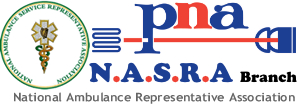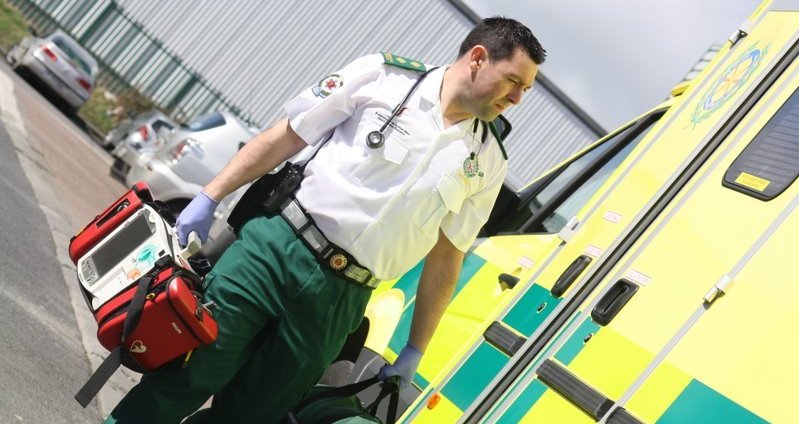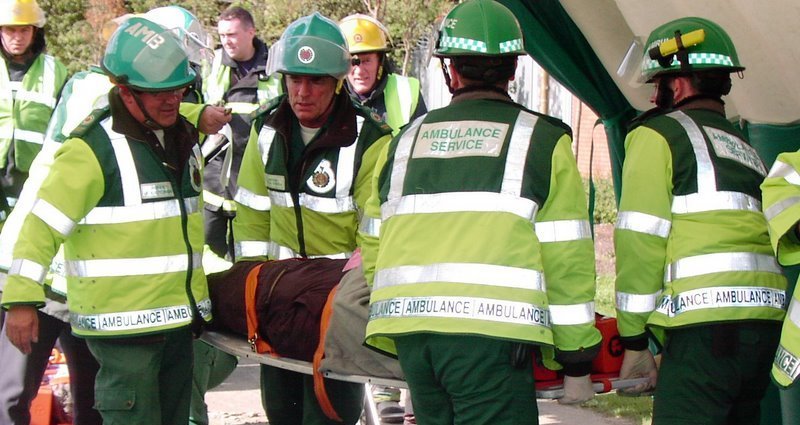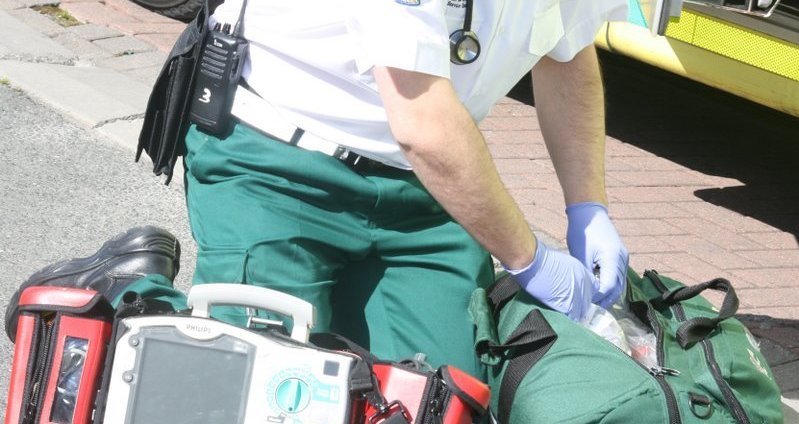29th March 2017
Submission: Re: Public Sector Pay Commission.
It is our understanding that the Public Sector pay Commission will not make any pay awards in the same way as the Benchmarking process did in the past. Instead you will identify those relevant factors which will be considered by the parties in negotiating the next Public Sector Pay Agreement.
Introduction.
The history of pre-hospital care in Ireland is relatively short but somewhat remarkable. It started in the 1890's when it was recognized that people injured or afflicted by acute medical conditions were dying or their conditions worsened by the transportation of patients is somewhat unsuitable vehicles but mostly by improper treatment by untrained good Samaritans. In 1898 the first full time Ambulance came into operation.
This was hailed as a fantastic development and councils and other institutions with responsibility for public health all across the country raced to develop their own service. These services handled accident services primarily whereas infectious or medical cases were handled by a Hospital ambulance normally staffed by a Driver and a Nurse.
In the 1960's the Health Board Act was introduced and one of its main points was that the Health Boards had the responsibility for the transportation of the patient from the home to the hospital.
Most Health Boards assumed control of rural and urban services which did away with the Driver and attendant role which lead to the Driver and ward Nurse been dispatched on an ambulance when required.
Further in the 1960's was the establishment of the national ambulance training school.
Another big step came in the early 1990's where the Eastern Health Board ambulance attendants could manually defibrillate and automated defibrillators became more mainstream.
In 1999 when the Pre-Hospital Emergency Care Council (PHECC) was established to regulate and promote a national framework in education and the establishment of SOP's (Standing Operating Procedures) for all Emergency Medical Technicians in Ireland and other statuary services. Initially the American model of Emergency Medical Service delivery was adopted but it was recognized in Ireland that the geographic and healthcare facilities required something different and so the PHECC decided to follow the Australian model under the late Dr Geoff King.
This model recognized long transport times to definitive care and other limitations and instead followed the path of University Trained Paramedics and Mobile Intensive Care and Advance Care Paramedics. University trained Paramedics and Advanced Paramedics also had the additional skills and knowledge to provide care normally reserved for Emergency Physicians, Cardiologists and Anesthetists and the ability to make complex clinical decisions based on a patient's individual need. These decisions were guided by Clinical Practice Guidelines (CPG's) a skill matrix that provide far more flexibility than the older SOP's for patient care.
This was the approach PHECC undertook and which firstly established the National Ambulance Service (NAS) and established its staff as healthcare professionals in their own right. In 2005 PHECC launched two new grades the Paramedic and the Advanced Paramedic which were ultimately to replace the EMT grade. Further to this the university role was expanded as were the training programs with the Paramedic training becoming a two-year diploma course and after 3 years post graduate experience the Paramedic became eligible for the Advanced Paramedic program which takes a further 2 years with a H.dip conferred on completion. There is also an option to progress from H.dip to a Master's of Science in immediate care. Essentially to reach the highest clinical level at present in Pre-Hospital Emergency care requires a dedication to 5/6 years formal training not inclusive of mandatory Clinical Practice Development. Further to that all practitioners EMT's, Paramedics and Advanced Paramedics require a licence to practice which allows independent practice in respect of their achieved scope of practice.
PHECC also established a fitness to practice policy to review any potential issues of negligence or improper practice. Essentially, we have progressed from drivers with limited first aid experience to a University trained self-regulating Professional.
Paramedics and Advanced Paramedics have been targeted as integral and essential to reforming the health service through how we deliver our care and skill base that we possess. We provide medications through oral, intramuscular, inhalatory, intra-vascular and intra-ossery routes. Skills that include advanced airway maintenance, 12 lead electrocardiograms and interpretation, obstetric emergencies and childbirth. Invasive procedures such as endotracheal intubation, surgical procedures such as surgical airways, re-inflation of collapsed lungs. We provide full cardiac Arrest Algorithms which essentially means that the cardiac arrest patient receives hospital care at the place they collapse. These clinicians now have access to consultants in emergency medicine for oversight and advise if a patient requires treatment that would not form part of a typical day to day practice. Thrombolytic therapy for dissolving a clot causing a heart attack normally reserved for the emergency department now been applied at scene when a time delay may see a patient falling short to reaching a hospital capable of making a definitive cardiac intervention.
Evidence in readily available that shows the OHCAR (Out of Hospital Cardiac Arrest) program has been immensely successful with results leading to many patients achieving ROSC (return of spontaneous circulation). These treatments and progress allow programs such as the Acute Coronary program designed to allow patients direct access to surgical interventions in the event of a heart attack possible, it has allowed patients suffering major trauma to reach the appropriate hospital/facility that is vital for the survival and recovery by by-passing smaller hospitals safely. We have lended ourselves to the development of Trauma centre's and other centres of excellence. We are trained in treat and referral techniques meaning the patient can be assessed and an immediate treatment plan for their particular condition can be initiated, it may mean the patient can be treated at home, by their GP or a specialist service as their condition may not be appropriate for an Emergency department (ED).
Our employers the NAS and our legislators still to this day only recognize our Paramedics and Advanced Paramedics as EMT's which ironically the EMT grade has been reimagined by the regulator PHECC and are a grade suitable for minor conditions and patient transfer from one facility to another or from a facility to home.
Paramedics now operate within the pre-hospital emergency setting with a skill set and matrix far removed from that portrayed within the technician's role. We are medical professionals who work alongside other medical professionals for the patient's best interest and we are no longer subservient or poorly educated Ambulance Drivers . We are scientists, researchers and clinicians which remains unrecognized by our employers and present and past governments within this country.
We ask that this Commission recognizes that the National Ambulance Service and its entire staff have developed over the past 25 years and that this evolution and development continues apace. It is also the case that the demands on staff have increased on an annual basis. In the following we are seeking to set out some of our grievances and issues related to pay which are of huge concern to the staff of the National Ambulance Service.
• Final 5% pay increase from last tranche of Benchmarking.
Ambulance Paramedics were awarded a significant pay increase in the first Benchmarking process to reflect the manner in which the profession had developed. However, a final payment due, to value of 5% has never been paid. This has not been addressed in the past 12 years. (2005). In the meantime, the profession has continued to develop with significant advances in educational preparation and daily practice.
• Full removal of PRD/Pension Levy.
The Pension Levy is a burden on ambulance staff as it is on all public servants.
• Full compensatory payment as per PSA .
The PSA was and is specific in relation to ALL LOSS OF EARNINGS under the PSA. This was/is not a selective process and HSE/NAS are in breach of agreement for not recognizing and non-compliance and payment in full at one and a half time the full loses.
• Full reversal of 10% pay cuts to all new entrants (All Grades).
As per other public sector bodies we are requesting the reversal of above.
• Recognition of Paramedic Grade (NAS).
We are seeking a full recognition of the three specific working grades within the pre-hospital emergency care setting for clinical recognition. Emergency Medical Technician Paramedic Advanced Paramedic.
• Comparator recognition to other Paramedical Grades (Radiographer, ECG Tech, Etc.).
This is line with full Paramedic Clinical Recognition and therefore all HSE/NAS practitioners should have equal status.
• Reversal of Overtime rate from time and a quarter back to time and a half.
During the austerity measures we were forced to take a reduction in incidental overtime rates from 1 ½ to 1 ¼. Since the introduction of the NEOC all operational staff within the HSE/NAS is not only not able to finish on time resulting in longer days without sufficient payment.
• Compensatory Rest period.
It has now become more regular that crews are forced into overtime resulting in shifts of anything up to 18 hour days. When availing of the European directive for compensatory rest the net result is they are being penalised by their basic pay been deducted which ultimately affects their pension but also the threat of disciplinary action if they attempt to refuse on reasonable grounds of a risk assessment or health and safety.
• Payment of Cardiac Allowance to all ICO staff.
ICO staff i.e.: Emergency Medical Technicians are and have been tasked with assisting EA crews at incidents such as RTC, Cardiac Arrest etc., but are refused the cardiac allowance. Further to this all ICO vehicles carry a defibrillator for practitioner interpretation and evaluation of patient's conditions.
• Fully integrated working Transfer Policy.
Due to the nature of the work undertaken by HSE/NAS crews the simplistic value of a working life balance needs to be addressed urgently to reverse the effects of burnout and sick leave absences caused mainly by the extraordinary long absences from home and family.
• Progression plan for EMT to Paramedic.
The recent capacity review of the National Ambulance Service has shown in great detail the numbers of recruits required to bring the service up to a sustainable working capacity. The progression/promotion of staff within the NAS would be seen as the way forward as the EMT will have obtained life experience not just with the delivery of the IHT service but of the various agencies within the pre-hospital emergency services and those within the definitive and primary care settings. The ICO service is a terrific apprenticeship for those staff among it to progress to full Paramedic level and provide a sustained recruitment base.
• Reduction in Pensionable Retirement Age.
At present the standard retirement age for a Paramedic is 67/68 years of age. We are seeking a reduction of this to 62 years for the following reasons:
Constant Exposure:
There is a significant exposure of Ambulance Paramedics to challenging and traumatic events not experienced by other public servants:
No other agency/service visits death by trauma/suicide/accident or due to mental health than the clinicians of the National Ambulance Service.
The continuous shift patterns from night to day to night.
The non-sustainable sleep patterns.
Dietary issues and availing of meal breaks.
Constant environmental issues such as weather patterns.
These factors must be taken into consideration in this Pay Review.
• Paramedic Allowance.
It is recognised that a Paramedic carries out at least 75% of the skill matrix of an Advanced Paramedic and in recognition of this we believe that the Paramedic should receive at least 75% payment of the Advanced Paramedic allowance.
• Incremental Credit for New Entrants/ICO Operatives and EMT's.
Staff that progress from EMT grade to Paramedic grade level at present receive no incremental credit as per previous years. New Entrants that have relevant experiences are also not receiving incremental credit for those experiences. This decision has to be reversed in order to attract staff from other grades to the NAS .
Finally, it is worth noting that the following included in appendix 1 (SEE BELOW), is an example of the Paramedic up-skilling undertaken since 2003 up to and including 2015. Over that 12 year period there had been not one cent increase to the Paramedics salary or was there any allowance offered in relation to parity with the same allowance offered to other grades.
______________________________ __________________________________
Mr Michael Dixon - National Chairman
Mr Tony Gregg - National Secretary
______________________________ __________________________________
APPENDIX 1
Paramedic Up skilling
2003 – Administration
• Aspirin & GTN for Cardiac Chest Pain.
2006 – 12 Lead ECG Interpretation and Transmission to ED Departments
2007 – Up –Skilling
• Advanced Airway – LMA
• IM Injections
• Glucagon - Hypoglycaemia
• Adrenaline – Anaphylaxis
Salbutamol Nebulisation – Adult & Paed 2010 –
• 12 Lead ECG
• Tracheotomy Care – Nationally 2011 Up-Skilling
• TR Band – Nationally 2011 Up-Skilling
• Advanced Airway Management Change – iGel.
• Hypothermia introduction for ROSC
2011 –
• Introduction of the Acute Coronary Syndrome (ACS) Programme
• Transport of ACS patient to PPCI
• Consent/ Revised Trauma Score/ Clinical Decision Making
• Respiratory Assessment
• Peak Flow
• Obstetrics and Gynaecology –
• Obstetrics Emergiencies
• Cord Prolapse
• Breech Birth
• Haemorrhage
• New Mediations
• Naloxone IM injection for Narcotic OD – Adult & Paed
• Paracetamol – Pain Relief – Adult & Paed
• Ibuprofen – Pain Relief – Adult & Paed
• GTN - Pulmonary oedema
• Trauma Management
• Tourniquet
• Brain Injury Management
2013/2014 – Upskilling
• ACS Programme
• Clopidogrel
• Ticagrelor
• Advanced Airway Change – King LT
• TETRA Radio
• Midazolam Buccolam – Adult & Paed
2015 – 2014 CPG Up-skilling
• Paracetamol – Pyrexia – Adult & Paed
• Capnography
• Ipratropium Bromide – Adult & Paed
• Epitaxis Management – Rapid Rhino
• Hydrocortosone – Adrenal Crisis Management – Adult & Paed





